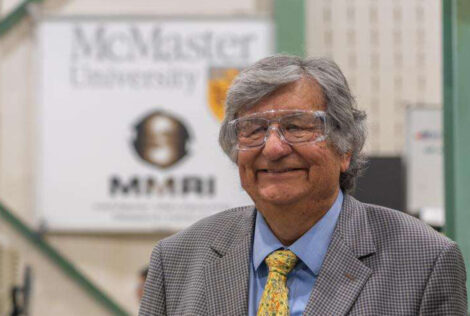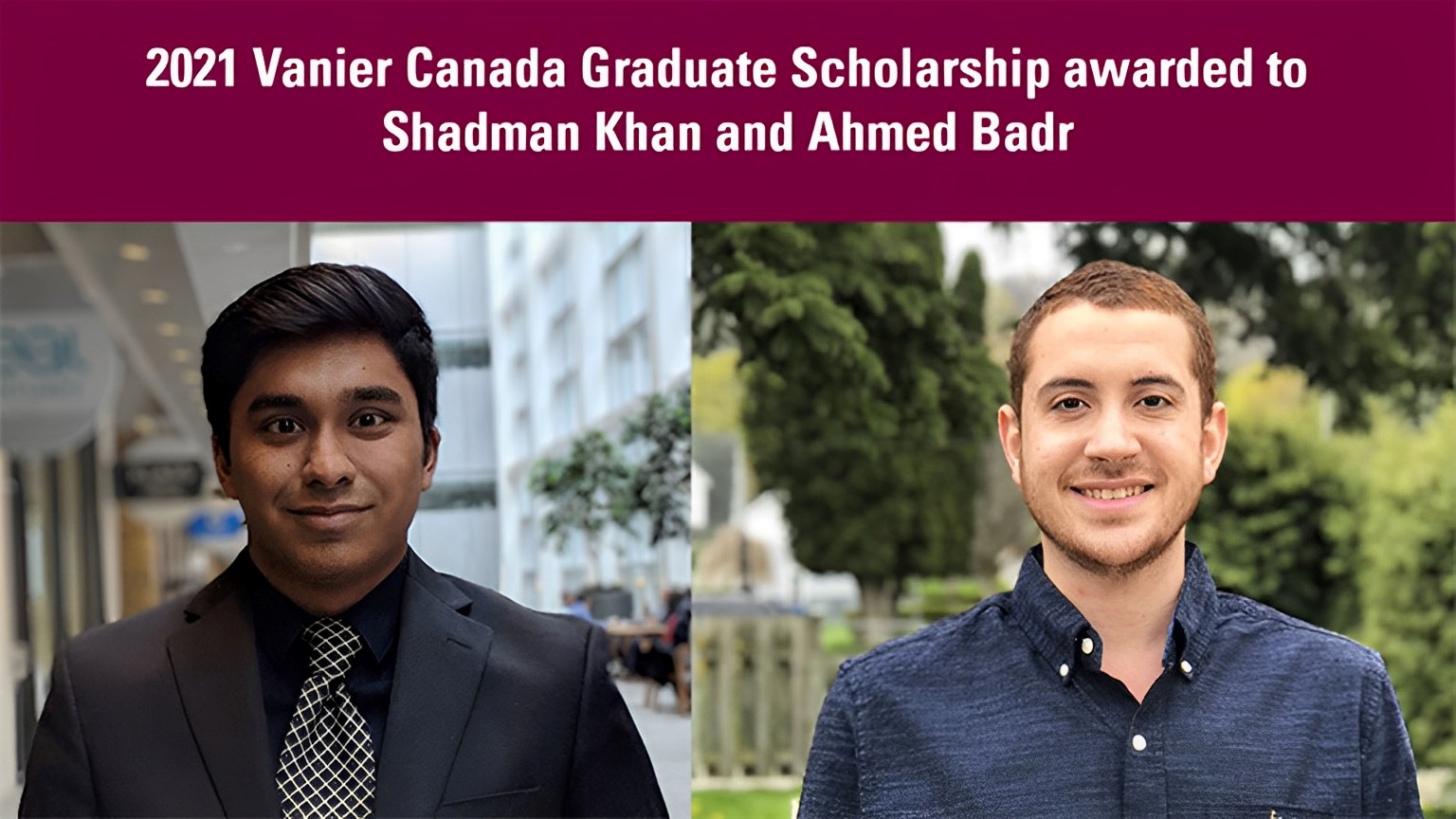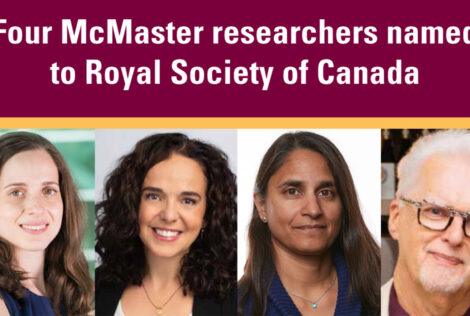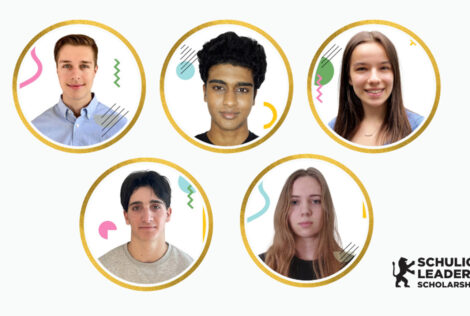

The Vanier Canada Graduate Scholarship is awarded to doctoral student researchers across Canada from health, sciences, engineering, social sciences and humanities. Candidates are rated on three criteria – academic excellence, research potential and leadership.
In 2021, seven doctoral students from McMaster University have been selected to receive the scholarship, including two from the Faculty of Engineering.
The scholarship is jointly administered by the National Sciences and Engineering Research Council (NSERC), Canadian Institute of Health Research (CIHR) and Social Sciences and Humanities Research Council (SSHRC) awarded $50,000 per year over three years to 166 Canadian graduate students this year.
Shadman Khan, PhD Student in Biomaterials Engineering
Shadman Khan is investigating new biomaterials that aim to improve food safety and reduce waste in the food industry.
“I’m very grateful to be receiving this award,” says Khan. “I’m working under the mentorship of excellent scholars and researchers, and to be awarded this scholarship makes me believe that I really belong in this line of work.”
Khan’s research is part of a project between McMaster University and Toyota Tsusho Canada Inc (TTCI) that is developing a bacteria-detecting patch that can indicate when food is contaminated by pathogens, including strains of E. coli and Salmonella. His work is supervised by Tohid Didar, an Assistant Professor with the Department of Mechanical Engineering and a specialist in biomaterials and micro- and nano-engineered interfaces.
“This project has helped build the relationship between McMaster University and TTCI,” says Didar. “There are high expectations for the future of this research.”
Foodborne illness is a huge burden on the healthcare system and food waste costs the economy in the range of tens of billions of dollars per year. Yet, it is not presently feasible to individually check food products. The biomaterial Khan is developing will make it possible to check individual food products for contamination and spoilage along the entire food supply pipeline – from production to grocery store shelves.
Khan began researching smart materials during his undergraduate thesis, which he also completed in the Didar Lab. His thesis work resulted in the development of a patent-pending bacteria and blood-repellent material to be used within biomedical devices. Upon completing his undergraduate degree in Biomedical Discovery and Commercialization, he transitioned directly into his PhD, with the support of a McMaster University Biomedical Engineering Scholarship. Now shifting the focus of his work to the food industry, the team hopes to address a longstanding issue that has had massive societal implications.
“Recall of food is very common, it happens every other day,” says Didar. “Shadman’s research has a strong economic case for reducing the amount of food that goes to waste. It also has great potential beyond foodborne pathogens, transferring into biomedical devices.”
Outside of his academics, Khan has engaged in many leadership roles within his various communities. From co-founding a non-profit student business and leading a political youth collective during his high school years, to becoming a multi-award-winning Residence Advisor and president of his undergraduate program’s student society at McMaster University, Khan’s drive to bring about positive change has consistently paired his academic excellence.
“Mentorship I have had through all of my experiences has helped me grow as a researcher, as an academic and as a student,” says Khan. “I’m very excited to be able to push my research further and engage in the broader community through conferences and talks over the coming years, thanks to this scholarship.”
Ahmed Badr, PhD student in Civil Engineering
Ahmed Badr is working with supervisors Wael El-Dakhakhani and Zoe Li to model dams as a mechanism for predicting and mitigating the impacts of climate change. With five Canadian provinces and territories relying on hydroelectric power for more than 85% of their total electricity consumption, and over 15,000 dams of various sizes across the country, resiliency of these complex systems is paramount.
“Ahmed is creating a digital twin model of dams. By compiling necessary inputs, this model can assess how climate change affects the dam, and how the dam affects climate change,” said El-Dakhakhani, adding, “Very few people in Canada are looking at dams as infrastructure.”
Badr is the second doctoral researcher studying under El-Dakhakhani’s supervision to be awarded the Vanier Scholarship in two years. In 2020 the scholarship was presented to Moustafa Naiem.
Hydroelectric power generation does not produce CO2 emissions and is an important tool in supplying electricity to Canadians while mitigating greenhouse gas emissions. At the same time, increased precipitation caused by climate change place Canada’s legacy dams at risk of damage due to flooding.
“Uncertainty caused by climate change presents safety concerns for dams,” said Badr, “We want to help ensure the safety of people and ecosystems upstream and downstream of Canadian dams while giving governments and hydropower operators the information they need to plan and manage dams.
“Efficiently managed dam systems can help citizens and governments – by keeping people safe, and helping governments manage greenhouse gas emissions,” added Badr.
Badr’s project investigates a grand challenge; how can a system impacted by climate change be used to influence climate change?
Li, an expert in optimization comments, “Ahmed is investigating both operation and risk assessment for dams, looking at both the built and natural environments that compose the systems surrounding a dam. It is a very difficult project. With more precise models and understanding of these systems, they can be optimized afterwards.”
Ontario Power Generation is an important partner in the project, providing a lot of data for Badr to use to develop his model.
Badr has an impressive history of leadership in education. In Egypt, where he grew up and obtained his undergraduate education, Badr helped create a literacy education centre for poor residents in rural areas. He also worked on a professional development program for Egyptian engineers focused on increasing the base standards for knowledge development. This included seminars, workshops and real-life scenario exercises. One such opportunity was to allow junior and mid-level engineers an opportunity to role play being manager of a major engineering firm.
“I feel like the luckiest person at McMaster to have the support of two amazing supervisors,” says Badr, a humble and hardworking researcher.
Badr’s research is largely computational work he can do remotely. Still, his achievement is even more impressive given the COVID-19 pandemic began during the first year of his PhD.
“The hardest part is the mental side, I have a family and a child at home, so it isn’t always easy managing distractions,” says Badr.


